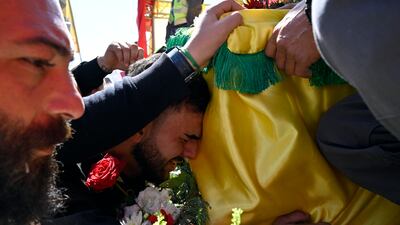As a follow-up to the ceasefire agreement between Lebanon and Israel in November, the two countries agreed to form committees earlier this month to discuss three issues: their outstanding land border disagreements; Israel’s withdrawal from five border hills it still occupies in Lebanon; and the release of Lebanese prisoners being held by the Israelis.
From the beginning, Israel has sought to portray such negotiations as the first step towards diplomatic relations. “The goal is to reach normalisation,” an Israeli official recently declared, quoted by The Times of Israel newspaper. On the Lebanese side, however, the official position is that there is no intention to normalise, only to secure an Israeli withdrawal from Lebanese territory, seek the release of Lebanese citizens, and reach an agreement over disputed border points and close this contentious file.
From the Lebanese perspective, allegations that the administration of US President Donald Trump is trying to push Beirut in the same direction as Israel have been even more disturbing. On March 18, Lebanon’s An-Nahar newspaper published an article quoting an unnamed “Lebanese personality” who met US special envoy Steve Witkoff in Doha recently. The envoy reportedly told him that “Lebanon will be asked to move to direct face-to-face political negotiations with Israel and name a civilian official for this task”. The Israelis, Mr Witkoff is believed to have added, would be represented by that country’s Minister of Strategic Affairs, Ron Dermer.
The envoy also allegedly told his Lebanese interlocutor that there would be no reconstruction in the south, the Bekaa, and Beirut’s southern suburbs before such a process begins, nor would the inhabitants of “frontline border towns” be allowed to return home. Israel would continue to hold the occupied hills for about a year and would not negotiate over the 13 land border points still in dispute.

Mr Witkoff publicly denied the An-Nahar report, describing it as “baseless, false and misleading”. Yet few in Beirut were reassured, given the Israeli statements on normalisation and how close the Trump administration is to Israel. One can speculate whether such off-the-record remarks were designed to raise the heat on Lebanon, given that Mr Witkoff allegedly told his interlocutor that the Americans were dissatisfied with how Lebanon was dealing with Hezbollah.
If that’s the thinking in Washington, the Americans should be careful. Lebanon is too divided a country today to be able to afford a divisive internal dispute over relations with Israel, particularly when it has much more pressing challenges. Any idea that, because Lebanon is fragile and Hezbollah is weakened, the country can be bludgeoned into a normalisation process that it doesn’t want may crack open its dangerous rifts.
At the same time, if there is some truth in the An-Nahar report, and this echoes the mood in the Trump administration, it’s up to the Lebanese to prepare a pre-emptive approach to address the implications. To assume that such a detailed exchange was simply invented by a Lebanese figure visiting Qatar is unconvincing. Hence, some anticipatory Lebanese steps may be necessary. What might the contours of such an approach be?
First of all, the Lebanese government has to again make clear that normalisation with Israel would be a step too far for a country that needs to rebuild the domestic authority of the state. To push Hezbollah and its communal supporters in such a direction would provoke a backlash that would not only undermine the state’s credibility; it would also be exploited by the group to revive itself, mobilise its base and retain its weapons.
Second, the Lebanese have to bring long-term discussions with Israel back to a format that can be legitimised. The obvious format is the Lebanese-Israeli Mixed Armistice Commission established when the two countries negotiated the Armistice Agreement of March 23, 1949. However, the agreement may need to be updated in light of realities today, which can be done by amending the agreement’s annexes.
With regard to Mr Witkoff’s purported demand that a civilian representative be designated, there is a precedent from which Lebanon can take advantage: the maritime border negotiations concluded in 2022. Ultimately, it was then-president Michel Aoun, a civilian, who carried them out, albeit indirectly through Amos Hochstein, the US envoy at the time.
Direct talks through the Mixed Armistice Commission and indirect talks through President Joseph Aoun on the land border disputes may be a way of nipping any potential American demands in the bud, thereby relying on precedents that can preserve domestic unity. This won’t lead to a peace agreement, but it will revive an Armistice Agreement that guarantees that no military actions again take place across the southern border.
In parallel, the Lebanese should initiate negotiations with the new government in Syria to resolve the contested border in the Shebaa Farms area. Their outcome would end any ambiguity over to which country the farms belong – Syria or Lebanon.
Finally, the Lebanese government must begin a dialogue with Hezbollah on finding a solution to the group’s weapons and implementing UN Security Council Resolutions 1559 and 1701. A return to the Armistice Agreement, like the large Lebanese majority’s opposition to the group’s holding weapons, could compel Hezbollah to make concessions on this front.
Such measures may fall short of normalisation, if that is indeed what the Americans want, but they would fall within the confines of what the government could sell at home. By pushing too hard, the US may throw the baby out with the bathwater. Most Lebanese want an end to hostilities with Israel, but do not necessarily embrace normalisation. A formula that balances these aims is what is needed today.


